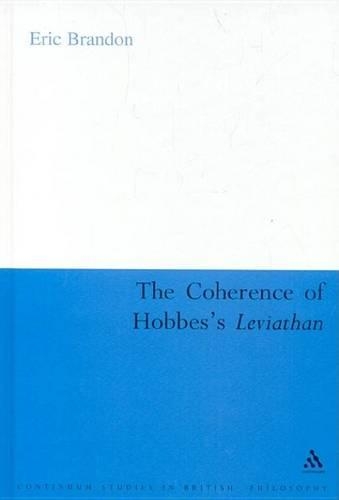
The Coherence of Hobbes's Leviathan: Civil and Religious Authority Combined
(Hardback)
Publishing Details
The Coherence of Hobbes's Leviathan: Civil and Religious Authority Combined
By (Author) Eric Brandon
Bloomsbury Publishing PLC
Continuum International Publishing Group Ltd.
31st January 2007
United Kingdom
Classifications
Professional and Scholarly
Non Fiction
320.1
Physical Properties
Hardback
160
Width 156mm, Height 234mm
380g
Description
Seventeenth-century Europe witnessed intense and widespread political and sectarian strife. In England, these conflicts led to the Civil War, the execution of Charles I, the restoration of Charles II, and the Glorious Revolution. Just before and during the English Civil War of the 1640s, Thomas Hobbes wrote in defence of the monarchy in the face of attacks by Parliament - his aim being to eliminate the root causes of civil war and internal strife, whether politically or religiously motivated. This book examines Hobbes's arguments for how best to achieve this aim, taking fully into account the political, philosophical, and religious context of Hobbes's time. Eric Brandon contends, controversially, that Hobbes's arguments in Leviathan are founded upon both philosophical materialism and the religious ideas of the Radical Reformation. Brandon's position represents an original challenge to the two prevailing views, which are that Hobbes is either an atheistic materialist using religious language to hide his atheism, or that he sincerely held orthodox religious views despite his materialism. Brandon argues instead that Hobbes should be seen as synthesizing materialism and the Radical Reformation to produce a new political philosophy. The book shows for the first time how the secular Parts I and II of Leviathan fit together with the more religious Parts III and IV to form a coherent whole.
Reviews
Mentioned in The Chronicle of Higher Education. March 23, 2007. Volume LIII, No. 29
'Brandon's book is sure to assume a central place in further debates over Hobbes's political theory. I commend it in the strongest terms.' Russell Hardin, New York University * Blurb from reviewer *
Author Bio
Eric Brandon received his Ph.D. from the University of Chicago, USA and currently teaches philosophy at Cape Fear Community College, North Carolina, USA. His publications include Hobbes and the Imitation of God, Inquiry 44:2 (2001).
